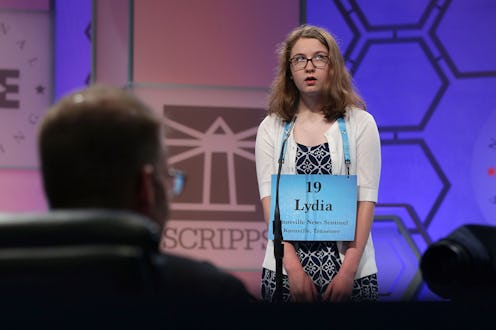News
How Scripps Made Sure The Spelling Bee Was More Accessible To *All* Kids This Year

Good news, language fiends: The nation's famous annual spelling bee is nearly here. If you're a fan of competition and of the written word, chances are that you're wondering how many Spelling Bee contestants there are in Scripps' national event this year.
There will be 519 spellers in 2018, a huge boost from the 291 contestants who competed in 2017, according to CNN. None of them are older than 15 (they need to have been 14 years old or younger as of August 31, 2017) and none has advanced beyond the eighth grade, as of this past February.
Why are so many additional youngsters taking part this year? According to NewYorkUpstate.com, it's because of a new program called RSVBee. Launched for the first time this year, RSVBee is invitation-only (parents apply on behalf of their kids) and is an attempt to open up the competition to kids who've had only limited access to the bee before, or no access at all.
"RSVBee is our sincere effort to take a step toward fairness," Scripps wrote of the program on its website. "We believe the National Finals are as fair as possible, but the path to Bee Week is not a consistent or equal journey."
"Throughout our 90-year history, we have had sponsored regions and unsponsored regions," the explanation continues. "This means students in a sponsored county have a shot at advancing to the National Finals while students in a neighboring county without a sponsor have no shot. The sizes of sponsored regions also are not created equal — only one speller in all of Georgia can currently advance to D.C., while Ohio sends 18 spellers."
As huge as 519 seems, the initial pool was much, much bigger. The National Spelling Bee's website notes that 11 million students competed to win a spot in the finals. The National Center for Education Statistics reports that about 35.6 million students were enrolled in K-8 education in the United States last fall. That means that about 31 percent of all eligible students entered the competition.
According to its website, the Scripps bee's goal is "to help students improve their spelling, increase their vocabularies, learn concepts and develop correct English usage that will help them all their lives."
The event has been happening for over 90 years: The first took place in 1925. Since then, the bee has become one of the most highly-anticipated annual events in the country, attracting over a million viewers and inspiring beloved films like Akeelah and the Bee and Spellbound.
The spelling bee winner receives $40,000 in cash and a trophy from Scripps. From Merriam-Webster and Encyclopædia Britannica, they also receive a $2,500 savings bond; extensive reference materials, including a replica of the 1768 edition of the Encyclopædia Britannica; and access to online encyclopedic materials.
Last year 12-year-old Ananya Vinay won the bee with the word "marocain," a word that's Scandinavian in origin and refers to a type of dress fabric. "It's like a dream come true," Vinay said after the event. "I'm so happy right now."
She'd come close to making it into the top 50 group of spellers the year before, but narrowly missed after messing up the word "multivalent." Her father told The Chicago Tribune that his daughter had "panicked" when she made the mistake. "I think she learned from that and she consciously worked on it, how you shouldn't panic, just focus on the word."
Hundreds of spellers will be forced to confront these same fears. It's sure to be an exciting event, so don't miss it. The bee will take place between May 29 and May 31 in Washington, DC.